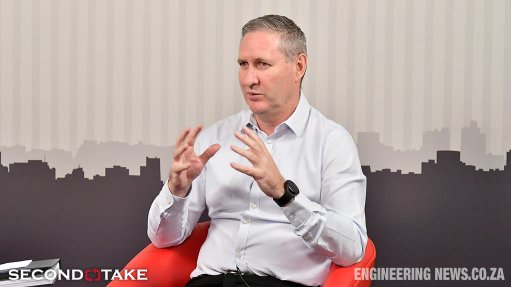Smart Borders concept a possibility through collaboration


JUANITA MAREE As technology evolves, so does the concept of borders; however, stakeholders need to ensure that border-specific technologies continue to break new ground
The resolution of border control challenges and the implementation of smart borders can be accomplished through cooperation, collaboration and trust-building between the public and private sectors.
As technology evolves, so does the concept of borders; however, stakeholders need to ensure that border-specific technologies continue to break new ground and simplify and speed up increasingly complex customs and trade-related procedures.
The Covid-19 pandemic suspended many ambitious plans, with borders closing, countries locked down, reduced trade, congested borders and businesses closing, and had halted decades of work towards an integrated world and the free movement of people and goods.
Speaking to Engineering News in her personal capacity, logistics expert Dr Juanita Maree said that the closures and shutdowns had, however, brought all stakeholders closer together to find solutions to the challenges, with more collaboration, cooperation and trust on the cards.
Maree, who is also Savino Del Bene South Africa executive director, explained that the sudden closure of borders and the restrictions on trade and business have shown, more than ever, how important trade is to countries and the global economy.
The closures on an unprecedented scale highlighted how integrated the supply chain has become and how reliant countries are on each other.
The limited movement of people and reduced capacity of operations at land, air and sea borders revealed pressure points in border posts, governments and institutions. It showed that government cannot do it alone and highlighted the need for aligned and cohesive policies.
Now government and the private sector are starting to work more closely, with the public sector more inclined to accept proposals from the private sector, she said.
“We are getting into a landscape where we are building trust and ensuring transparency and accountability.”
This would ultimately alleviate the long-standing challenges faced at borders.
Currently, one of the most significant and visible challenges is the delays for cross-border road freight at various border posts, owing to uncoordinated movement of goods through border crossings and poor procedural efficiency.
Regional cross-border road freight and transit waiting times extend into hours, which costs millions of rands.
The Covid-19 pandemic wreaked further havoc, leading to container imbalances, port and terminal congestion, no crew changes and low productivity and supply shocks, amid bottlenecks across both international and domestic supply chains, as well as at crucial points such as port terminals, freight corridors and warehousing and distribution facilities.
With the rapid rise of the Fourth Industrial Revolution, some borders have started implementing technology to simplify procedures, improve security, increase data collection accuracy and store data more efficiently.
“Initiatives such as one-stop border posts, single window systems, authorised economic operators, bond guarantees, GPS tracking and radio-frequency identification, among other advancements, are once more changing the entire landscape of cross-border trade,” Maree commented.
Further, data collected from cargo moving across borders and the results of inspections have allowed customs officials to identify, manage and mitigate any risks.
Maree pointed out that all these technological advancements can be collectively included under the World Customs Organisation’s umbrella term Smart Borders, which focuses on a move towards a technology-driven environment that facilitates and expedites people and the movement of goods across borders while maintaining and enhancing controls.
The risk management-based and technology-driven smart border concept, guided by the principles of security, measurability, automation, can strengthen customs administrations’ facilitation of trade and travel while mitigating the threats inherent in the cross-border flows of goods, people and means of transport.
In line with this, the Department of Home Affairs (DHA) and the Border Management Agency (BMA) gazetted a One-Stop Border Post policy broadly outlining government’s approach to converting South Africa’s road border posts to one-stop border posts.
However, the archaic “plug-and-play” One-Stop Border Post policy has become unfeasible, outdated and impractical, as it was designed for different environments.
Border controls should not operate under a one-size-fits-all approach, with each border requiring its own blueprint solutions based on its own unique features, including infrastructure, operating hours and capacity, she explains.
She cited the example of the one-stop border post between Zambia and Zimbabwe, where more capacity building is required with a 24/7 operating model to bring back efficiency.
“We, in the private sector, argue that goods (trade) and people (immigration) require different approaches as they hold unique characteristics. The way forward is to establish an appropriate processing environment using available technology and create a solution inclusive of all stakeholder needs.”
While the South African Revenue Service (Sars), which presides over cargo movement management, is already well-equipped to manage the data processing side, there is a need to include all other government agencies on a single platform to streamline the process and prevent a hampered flow of goods.
“There is a need for a joint structure responsible for aligning the DHA/BMA with Sars and other stakeholders.
“Ultimately, it is not too late to develop an inclusive process, including the DHA/BMA, Sars and the private sector, that efficiently facilitates trade, reduces the costs of cross-border processes while complying with security and revenue mandates.”
EN
Comments
Press Office
Announcements
What's On
Subscribe to improve your user experience...
Option 1 (equivalent of R125 a month):
Receive a weekly copy of Creamer Media's Engineering News & Mining Weekly magazine
(print copy for those in South Africa and e-magazine for those outside of South Africa)
Receive daily email newsletters
Access to full search results
Access archive of magazine back copies
Access to Projects in Progress
Access to ONE Research Report of your choice in PDF format
Option 2 (equivalent of R375 a month):
All benefits from Option 1
PLUS
Access to Creamer Media's Research Channel Africa for ALL Research Reports, in PDF format, on various industrial and mining sectors
including Electricity; Water; Energy Transition; Hydrogen; Roads, Rail and Ports; Coal; Gold; Platinum; Battery Metals; etc.
Already a subscriber?
Forgotten your password?
Receive weekly copy of Creamer Media's Engineering News & Mining Weekly magazine (print copy for those in South Africa and e-magazine for those outside of South Africa)
➕
Recieve daily email newsletters
➕
Access to full search results
➕
Access archive of magazine back copies
➕
Access to Projects in Progress
➕
Access to ONE Research Report of your choice in PDF format
RESEARCH CHANNEL AFRICA
R4500 (equivalent of R375 a month)
SUBSCRIBEAll benefits from Option 1
➕
Access to Creamer Media's Research Channel Africa for ALL Research Reports on various industrial and mining sectors, in PDF format, including on:
Electricity
➕
Water
➕
Energy Transition
➕
Hydrogen
➕
Roads, Rail and Ports
➕
Coal
➕
Gold
➕
Platinum
➕
Battery Metals
➕
etc.
Receive all benefits from Option 1 or Option 2 delivered to numerous people at your company
➕
Multiple User names and Passwords for simultaneous log-ins
➕
Intranet integration access to all in your organisation


















